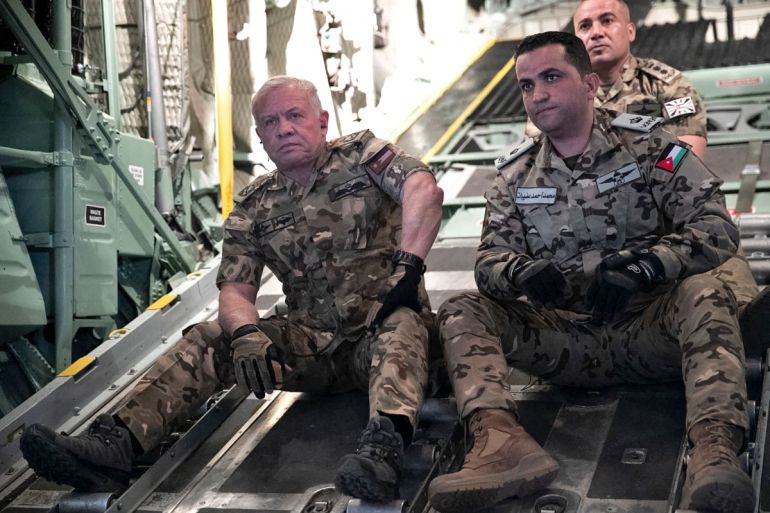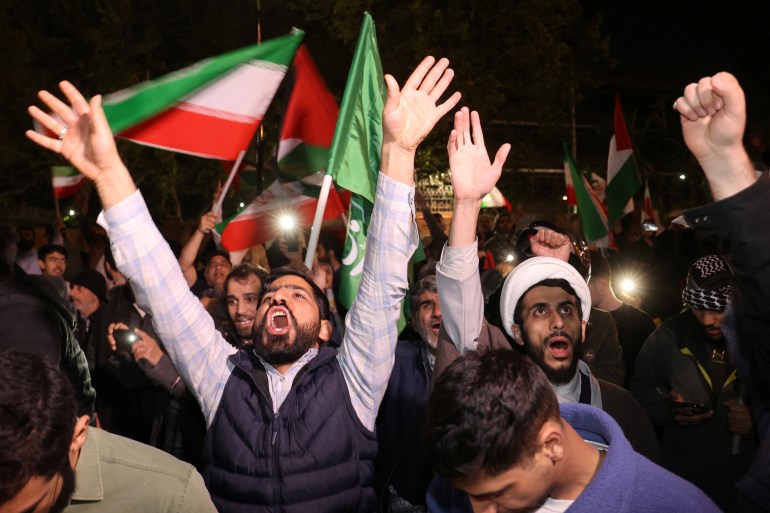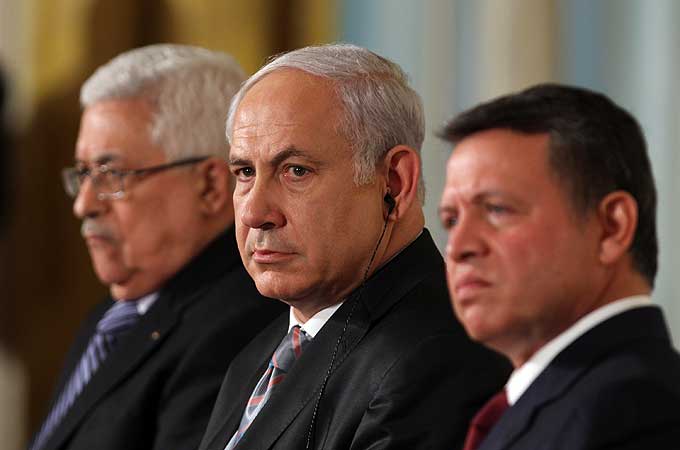Tightrope: Jordan’s balancing act between Iran and Israel
As regional tensions soar, the kingdom is contending with domestic as well as international pressures.

The Hashemite Kingdom of Jordan is caught between two regional powers and could face serious social, political and economic repercussions should regional tensions continue to intensify.
Jordan’s tenuous position means that any regional action – an intensification of hostilities between Iran and Israel or an Israeli invasion of Rafah – can have incendiary repercussions domestically.
Keep reading
list of 3 itemsAre Jordan’s government and pro-Palestinian protesters facing off?
Jordan’s King Abdullah II presses Blinken to push for a ceasefire in Gaza
“Any imminent Iranian-Israeli war is going to put Jordan on a tightrope,” Sean Yom, an expert on Jordan at Temple University and the author of From Resilience to Revolution, told Al Jazeera. “Publicly, it has to stay out of the fray; it cannot side with any combatant.”
Jordan has pushed for a ceasefire in Israel’s war on Gaza and publicised its aid distribution efforts in the besieged enclave.
But that has done little to appease the scores of protesters who have rallied outside the US and Israeli embassies. Among their demands are ending relations with Israel and the United States.
Since October 7, protests in Jordan have ebbed and flowed as Israel’s campaign in Gaza killed more than 34,000 Palestinians.
Analysts say the monarchy has tried to press the US and Israelis for a ceasefire and an increase in aid entering Gaza, but those efforts have had little impact.
A more recent incident has enraged people further.
‘A matter of principle’
Overnight on Saturday, April 13, the Royal Jordanian Air Force took to the skies to intercept and shoot down dozens of Iranian drones as they flew over Jordan’s territory on their way to Israel.
Iran had fired more than 300 missiles and drones at Israel in retaliation for an alleged Israeli strike on Iran’s consular building in Damascus. A senior Islamic Revolutionary Guard Corps (IRGC) commander, Brigadier General Mohammad Reza Zahedi, was killed in the attack along with other commanders.
The Jordanian government said it was defending its national borders.
“There was imminent danger of drones or missiles falling in Jordan, and the Jordanian armed forces dealt with this danger in the appropriate manner,” Jordan’s Foreign Minister Ayman Safadi said.
“We will not permit anyone to jeopardise the security of Jordan and the Jordanians … This is a matter of principle and these are steps we have taken in the past. We took them yesterday and we will take them in the future, whether the source of the threat is Israel, Iran or any [other] element.”
Jordanians have strong sympathy for Palestinians. Including an estimated two million Palestinian refugees, with a sizeable part of the population in Jordan being of Palestinian origin and native Jordanians having a strong solidarity with Palestine.
Some accounts on social media labelled Jordan’s King Abdullah “a traitor” for his country’s role in shooting down Iran’s drones.

Jordan’s actions also initially brought the ire of Iran. Fars News Agency, which the IRGC manages, said Iran’s armed forces threatened that Jordan could be a future target if they interfere with Iran’s military operations against Israel.
“The Iranians actually went after the Jordanians and the king and his family very aggressively,” Vali Nasr, professor of international affairs and Middle East studies at Johns Hopkins University in the US, told Al Jazeera.
The two parties quickly buried the hatchet, with Iran’s Mehr News saying Safadi told Iran’s Foreign Minister Hossein Amir-Abdollahian by phone that Israel would not “abuse its airspace”.
“On Sunday [April 14], the Revolutionary Guard proclaimed Jordan as a potential target as it saw the Hashemite Kingdom as collaborating with Israel, but on Monday [April 15], the Iranian Foreign Ministry smoothed over any ruffled feathers, calling Jordan a diplomatic partner and an ordinary state which had normal relations with Iran,” Yom said.
In fact, this incident could lead to warmer relations between Jordan and Iran. The two have discussed normalisation in the past and Nasr believes this incident may have acted as an accelerant.
“I think the Jordanians, much like the Saudis, will come to the conclusion that ultimately having zero relations with Iran does not really defend their interest,” he said.
Jordan’s tight spot
“Jordan may suffer collateral damage [in the event of a wider war],” Yom said. “It could suffer physical destruction, as well as economic injury from the loss of tourism revenues and potential trade flows.”
In the early hours of April 19, US officials claimed that an attack inside Iran had been carried out by Israel.
Explosions were heard in Isfahan and Iranian authorities said three drones had been downed but gave no credence to it being an external attack, saying only that an investigation would be launched. Israel did not claim responsibility.
Safadi took to social media the same day, posting: “We warn against the danger of regional escalation. We condemn all actions that threaten dragging the region into war… Israeli-Iranian retaliations must end… The focus of the world must remain on ending the catastrophic aggression on Gaza.”
But for the Jordanian government, attempts at reaching some sort of calm in the region have not yielded much.
“[T]here is considerable frustration that allies like the US support Jordan’s national defence, but continually counter its policy preferences and its advice, by failing to secure a ceasefire, failing to prevent regional escalation, failing to get more aid to Palestinians suffering in Gaza, and then even being the sole veto in the vote for Palestinian statehood at the United Nations,” Curtis Ryan, author of three books about Jordan, told Al Jazeera.
“The king finds Netanyahu an impossible interlocutor,” said Jose Ciro Martinez, an expert on Jordan at York University in the United Kingdom.

Domestic troubles
“I think most Jordanians are upset that the kingdom is caught in the crossfire of regional conflict – one they didn’t ask for and one they don’t want to escalate,” Yom said.
A Jordanian researcher, who monitored the protests and requested anonymity, said most people were not surprised by their state’s reaction to the Iranian response, considering the close security ties with the US and Israel.
Some have even started selling missile fragments on an online marketplace.
Protesters did not flock to the streets over the downing of Iranian drones. While some criticised the government on social media, most of the frustration was directed elsewhere.
“Some criticised the government for cooperating with the US and Israel in shooting down the Iranian missiles and drones,” Yom said.
“But publicly, most lay the blame on Netanyahu’s government since the Israeli state is the actor that bombed the Iranian consulate in Damascus, not to mention the genocide in Gaza.”
Still, Jordan’s domestic situation will have the monarchy on edge. Even before October 7, the country was facing numerous challenges on its borders and domestically.
The economy, which took a major dive during the COVID-19 pandemic and had been slowly rebounding, was hit “massively” by the recent war, Ibrahim Saif, a senior fellow at the Middle East Institute and former Jordanian minister, told Al Jazeera.
“We have witnessed severe slowdown in some economic activities that impact Jordan directly and indirectly,” he said, mentioning tourism and the ambiguity surrounding the private sector.
“Now you can add the threats to cutting [funding for] UNRWA [the United Nations Relief and Works Agency for Palestine Refugees in the Near East] which serves at least one million people in Jordan. All of that has resulted in huge pressure on the Jordanian economy that also translates to politics.”
All eyes will now be on Rafah in Gaza, where residents fear a ground invasion by the Israeli army may be imminent.
Should that come to pass, protesters could descend to the streets again.
While protesters peacefully took to the streets in front of the Israeli embassy on Friday in solidarity with the people and resistance of Gaza, the energy of protests, particularly during Ramadan, has subsided even though hundreds still showed up around the Israeli embassy nearly every day, analysts and observers said.
Occasionally violent crackdowns and arrests, paired with what some analysts called protest fatigue or despair, may have discouraged them.
“Normally, if the protests are domestic, the king will replace a prime minister. But he can’t offer the protesters anything this time,” Martinez said. “When [the monarchy] has nothing to offer is when they start to arrest people.”
Jordan’s security forces have experience in managing protests. The use of arrests and occasional violence has taken the wind out of some of the demonstrations in the past, and the longer protests carry on, security forces will hope that participants will lose hope and go home. That, analysts and observers say, has started to happen.
“Protest fatigue has set in, as authorities have tolerated relentless popular mobilisation for months,” Yom said. “Many activists are resigned with a profound sense of despair that their actions are not going to change the situation.”